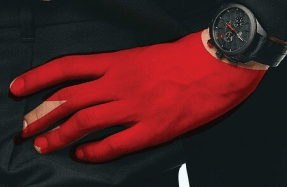
A SUMMER AFTERNOON IN NEW YORK’S WEST VILLAGE, A WARM day fast turning hotter, and inside Buvette Gastrothèque—a tiny bistro so perfectly Parisian that there’s another one in the Quartier Pigalle, a few blocks from the Moulin Rouge—Aaron Taylor-Johnson is scooping up ruddypink globs of steak tartare and packing them like wet sand onto little ellipses of toasted bread, one bite at a time.
The size of the space means we’re out in the open, visible. His eyes dart to the front door every time it opens. His body language says he’s ready to be recognized, to be spotted—not waiting for it but scanning, steeling for it.
It doesn’t happen. Either everyone’s being chill about his presence or nobody associates the guy at the table with the things he’s been in. You’ve definitely seen him in things, though. That was him in Avengers: Age of Ultron, as a mutant dying a plot-twist death. That was him in Tenet, behind a massive Special Forces beard. Or you may have watched the long scene in Nocturnal Animals in which a redneck serial killer torments Jake Gyllenhaal and his family—just unmanning poor Jake—and thought, halfway through, Wait—is that the kid from Kick-Ass?
Which it was. He looks different in practically every movie. Mustache, no mustache. Weird hair, less-weird hair. Bulking up, slimming down. A one-man Guess Who? board. Today, his look says Young Mafia Don Bound for Miami. He futzes with a couple gold chains while he talks. They slip in and out of the collar of his seventies-dude tan polo shirt, which matches his pants, which match the suit jacket draped over his chair. His hair is longish, curly, a little sweaty. He’s lean, but his arms are like cinder blocks.
We’ve been on the record for five minutes, maybe ten, and already we’re getting into real shit. The work of parenting, the work of work. That impossible balance. The struggle to be present. He and his wife, director Sam Taylor-Johnson, are coparents to four kids, all girls, two from her previous marriage, three still at home—ages sixteen, thirteen, and eleven. “Teenagers, man,” says Aaron, who just turned thirty-three this week. “I’ve got teenagers.”

Last year, the Taylor-Johnson clan relocated to England, and he’s been explaining why. He and Sam are both from around London, and after Covid-cocooning in California, they felt the pull of home. They saw a window when they could move back without screwing up the kids’ academic lives unduly. And they both had work in the UK. Sam was directing the upcoming Amy Winehouse biopic Back to Black; Aaron had signed up to play an iconic Marvel villain in Kraven the Hunter, plus “another couple jobs that sort of set me in England for some time.”
After he shot —reteaming with director David Leitch on a reboot of the eighties TV series, with Ryan Gosling as the titular Guy—and then went to Prague to be in Robert Eggers’s with some reshoots in between. So






